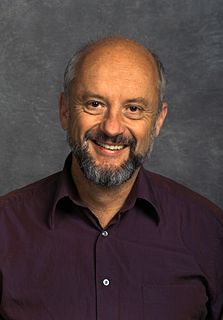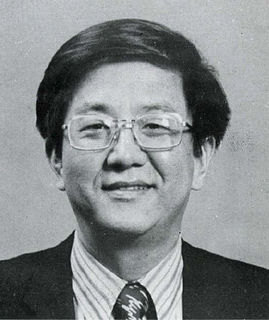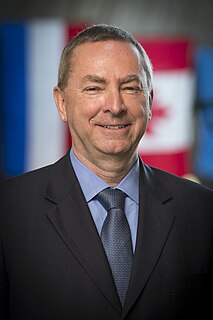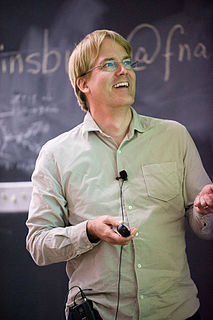Related Research Articles

Leon Max Lederman was an American experimental physicist who received the Wolf Prize in Physics in 1982, along with Martin Lewis Perl, for their research on quarks and leptons, and the Nobel Prize in Physics in 1988, along with Melvin Schwartz and Jack Steinberger, for their research on neutrinos. Lederman was Director Emeritus of Fermi National Accelerator Laboratory (Fermilab) in Batavia, Illinois. He founded the Illinois Mathematics and Science Academy, in Aurora, Illinois in 1986, and was Resident Scholar Emeritus there from 2012 until his death in 2018.

Piermaria J Oddone is a Peruvian-American particle physicist.
The Panofsky Prize in Experimental Particle Physics is an annual $10,000 prize given to recognize and encourage outstanding achievements in experimental particle physics, and is open to scientists of any nation. It was established in 1985 by friends of Wolfgang K. H. Panofsky, a professor emeritus at Stanford University and by the Division of Particles and Fields of the American Physical Society.

Benjamin Whisoh Lee or Ben Lee, was a Korean-born American theoretical physicist. His work in theoretical particle physics exerted great influence on the development of the standard model in the late 20th century, especially on the renormalization of the electro-weak model and gauge theory.

Nigel Lockyer is an American experimental particle physicist and current director of Fermi National Accelerator Laboratory (Fermilab), in Batavia, Illinois, America's premier laboratory for particle physics research, since September 2013.

Joseph David Lykken is a theoretical physicist at the Fermi National Accelerator Laboratory. Since July 1, 2014 he has been the Deputy Director for Research of Fermilab. He is currently leading the Fermilab Quantum Institute.

Marcela Carena is a theoretical physicist at the Fermi National Accelerator Laboratory and a professor at the University of Chicago and the Enrico Fermi Institute. She is the Director of International Relations at Fermilab, as well as the head of the Theoretical Physics Department. As of January 1, 2016 she is the Chair Elect of the Division of Particles and Fields of the American Physical Society.
Arie Bodek is an American experimental particle physicist and the George E. Pake Professor of Physics at the University of Rochester.
Mary Katharine Gaillard is an American theoretical physicist with a focus on particle physics. She is a professor of the Graduate School at the University of California, Berkeley, a member of the Berkeley Center for Theoretical Physics, and Visiting Scientist at the Lawrence Berkeley National Laboratory. She was Berkeley's first tenured female physicist.
Bruce Winstein was an experimental physicist and cosmologist noted for his early work in elementary particle physics, particularly work toward demonstrating a serious asymmetry between particles and their anti-particles. Later in his career, he worked in experimental cosmology, measuring polarization in the microwave background radiation whose properties date back to the early universe.

Peter Jenni, is an experimental particle physicist working at CERN. He is best known as one of the "founding fathers" of the ATLAS experiment at the CERN Large Hadron Collider together with a few other colleagues. He acted as spokesperson of the ATLAS Collaboration until 2009. ATLAS is a world-wide collaboration which started in 1992 involving roughly 3,000 physicists at 183 institutions in 38 countries. Jenni was directly involved in the experimental work leading to the discoveries of the W and Z bosons in the 1980s and the Higgs boson in 2012. He is (co-)author of about 900 publications in scientific journals.

Kam-Biu Luk is a professor of physics, with a focus on particle physics, at UC Berkeley and a senior faculty scientist in the Lawrence Berkeley National Laboratory's physics division. Luk has conducted research on neutrino oscillation and CP violation. Luk and his collaborator Yifang Wang were awarded the 2014 Panofsky Prize “for their leadership of the Daya Bay experiment, which produced the first definitive measurement of θ13 angle of the neutrino mixing matrix.” His work on neutrino oscillation also received 2016 Breakthrough Prize in Fundamental Physics shared with other teams. He also received a Doctor of Science honoris causa from the Hong Kong University of Science and Technology in 2016. Luk is a fellow of the American Physical Society, and the American Academy of Arts and Sciences.
Philip Michael Tuts is an American high-energy experimental particle physicist, and Professor and Chair of the Columbia University Physics Department. Tuts is a Fellow of the American Physical Society. He holds a seat on the executive committees of the United States LHC Users' Association and the American Physics Society Forum on Physics and Society, and is Divisional Councilor of the Division of Particles and Fields of APS. Tuts earned his Bachelor's in Physics from MIT in 1974, and his MA and PhD from the State University of New York at Stony Brook in 1976 and 1979, respectively. Tuts joined the physics department at Columbia in 1983 and was appointed Chair in 2014. Tuts is currently a member of the ATLAS experiment team at CERN and formerly served as US ATLAS Operations Program Manager.
Juliet Lee-Franzini was the founding faculty member of the high energy physics experimental group at the newly established Stony Brook University. She was a successful teacher and many of her students head particle physics research groups all over the world.
Charles Young Prescott is an American particle physicist.
Vera G. Lüth is an experimental particle physicist and professor emerita at Stanford Linear Accelerator Center (SLAC), Stanford University, in the United States. A senator of the Helmholtz Association, she has worked in particle physics at SLAC since 1974. She is a fellow of the American Physical Society.
Janet M. Conrad is an American experimental physicist, researcher, and professor at MIT studying elementary particle physics. Her work focuses on neutrino properties and the techniques for studying them. In recognition of her efforts, Conrad has been the recipient of several highly prestigious awards during her career, including an Alfred P. Sloan Research Fellow, a Guggenheim Fellow, and the American Physical Society Maria Goeppert-Mayer Award.
Paul Dutton Grannis is an American physicist.
William J. Willis was an American experimental particle physicist.
Tulika Bose is a Professor of Physics at the University of Wisconsin-Madison, whose research focuses on developing triggers for experimental searches of new phenomena in high energy physics. Bose is a leader within the Compact Muon Solenoid (CMS) experiment, a CERN collaboration famous for its experimental observation of the Higgs boson in 2012.
References
- ↑ biographical information from American Men and Women of Science, Thomson Gale, 2004
- 1 2 "1995 W.K.H. Panofsky Prize in Experimental Particle Physics Recipient, Frank J. Sciulli". American Physical Society.
- 1 2 "Frank Sciulli". Department of Physics, Columbia University.
- ↑ "Frank J. Sciulli". National Academy of Sciences.
- ↑ Gaillard, Mary K.; Grannis, Paul D.; Sciulli, Frank J. (1999). "The standard model of particle physics". Reviews of Modern Physics. 71 (2): S96. arXiv: hep-ph/9812285 . Bibcode:1999RvMPS..71...96G. doi:10.1103/revmodphys.71.s96.